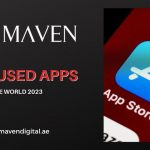Nowadays, every other person has a mobile phone in their hands. This is a golden opportunity for brands to reach their target customers easily. Businesses around the world are creating mobile apps to accomplish their awareness, engagement, and sales goals.
Users expect their mobile apps to function smoothly on all operating systems, including Android, iOS, and Windows. It has led developers to start preferring cross-platform frameworks to build digital solutions.
Cross-platform App Development Defined
Cross-platform or hybrid mobile development refers to building apps that support various operating systems. Developers need to create a backend for native apps that runs across many platforms, which adds to the complexity of mobile app creation.
But which cross-platform technology should you use to develop your business’s software solution? We researched and have hand-picked the five top frameworks to build hybrid mobile apps for you to innovate in 2023.
Best Cross-platform Frameworks to Build Mobile Apps
1- Flutter
A Stack Overflow Developer survey performed in 2021 found flutter to be the second most loved app development framework.
Developed by Google in 2017, Flutter is an open-source and free cross-platform mobile development framework. You need Google’s programming language Dart to build apps on flutter.
Pros
- You can develop apps for Linux, iOS, android, web, and desktop apps from a single codebase on Flutter
- Its Hot Reload feature allows you to view changes made in the code instantly
- It pulls out behavioral and visual widgets from Google’s material design library to build the best apps
- It is composed of a flutter engine to draw widgets and doesn't depend on web browsers to fetch information
Cons
- Flutter framework makes it difficult to create efficient TV apps
- It is not compatible with apple TV and Android TV
- Flutter apps are not as performant as native applications
- The apps created on this framework are heavy
Related Read: What’s New In Flutter 3: Diving Deep Into The Latest Features And Updates
2- React Native
Facebook or Meta platforms created React Native in 2015 as an open-source UI software platform.
React native is one of the popular cross-platform app development frameworks. Meta Platforms designed it as an open-source UI development framework.
Developers need to use JavaScript to build apps on this framework as it relies on Javascript’s framework, React. It enables you to create natively rendered hybrid mobile applications.
Pros
- You can use it without paying any fees
- It is compatible with multiple native functions
- It provides you with a few different components that help in writing code quickly and easily
- It allows you to use a universal language like JavaScript and also Swift, C, or Java programming languages designed for specific operating systems
- It allows you to write code once and reuse it where necessary
- Like flutter, React Native also exhibits a Hot Reloading feature which lets you view changes made in the code in real-time
- React native enables developers to build a highly consistent UI design
Cons
- You need to write separate code for native platforms if you want to add functions like an accelerometer or a camera
- It poorly performs in comparison to native platforms
- It doesn't launch updates consistently
- Along with speeding up app development, it also slows down the process of debugging, particularly on Android
3- Xamarin
Xamarin is an open-source framework for mobile app cross-platform development. Xamarin enables you to build the full mobile app using C# as a programming language.
Xamarin is ideal if you have already developed applications on the .NET framework. Acquired and maintained by Microsoft, Xamarin is an extension of the .NET UI software framework.
Pros
- It offers superior native performance than other cross-platform app development frameworks
- Programmers can reuse ninety percent of the code for an app project for 3 different platforms
- It supplies API integration flexibility which improves the performance of Xamarin-powered apps on native platforms
- Xamarin supports mobile hardware since it offers a wide variety of APIs and extensions
- It has a wide global community, especially consisting of C#, C, and C++ mobile app developers.
- Its Forms feature enhances data binding performance, which offers a compile-time guarantee for all binding expressions, lowering the number of runtime errors
Cons
- Large businesses have to purchase the license for Microsoft’s Visual Studio — a component of Xamarin’s toolkit
- Xamarin is a poor choice to build a UI/UX- rich app because every operating system layout graphics on screens in a different way
- It provides limited access to various critical libraries developers require for development purposes
4- Ionic
Ionic is one of the loved open-source, scalable, readable, and maintainable cross-platform app development frameworks. Ionic has a library of CSS, JS, and HTML modules, ideal for creating interactive mobile apps.
Ionic is the perfect option if you want to create a software solution with native features, customizable tools, and particular gestures that improves usability. But they depend on wrappers like PhoneGap or Cordova to operate as native.
Pros
- It has a variety of tools and functionalities, like UI components and outlines, that appear as native mobile-like and out-of-the-box compatibility for material design
- Ionic allows programmers to build apps with lightning-bolt speed as it offers the adaptability and robustness of Angular
- React, Angular, and Vue developers can also easily develop apps on Ionic as it supports these frameworks
- Ionic makes UI design development as easy as a breeze of air
- It has a large community of medium-sized businesses and enterprises that improves, update and maintain it
- It helps programmers to build attractive and creative user interfaces and UX functionalities with the application
Cons
- Ionic apps are less performant
- It's challenging to create in-app navigation while working on Ionic because of its complicated UI-router
- A couple of native extensions are unstable and cause conflict between them
- Some Ionic versions are super complex
- Its free version offers limited functionality and features
5- NativeScript
It is a famous open-source cross-platform framework for building android and iOS applications. Originally launched and designed by Progress, NativeScript uses typescript and javascript as programming languages and supports Vue and Angular frameworks.
Some popular apps built on this platform are Strudel, Breathe, and Daily Nanny. It provides all native APIs, enabling coders to reuse existing extensions directly from NPM into the applications.
Pros
- It offers WORA functionality which means you can reuse code components
- It enables programmers to easily access native iOS and Android APIs
- It removes the need for external apps as it provides multiple add-ons and built-in app templates
- Nativescript apps free developers from spending time on WebViews, which is an android system’s component that enables apps to display content from the internet within an application
- It renders platform-native user interfaces which allow native script apps to function directly on a native device
- It depends on well-known web development frameworks such as Angular and JavaScript
- It is compatible with segments such as AndroidArsenal and Cocoapods
- It furnishes stunning, flexible front ends that you can customize to particular gadgets and screens
Cons
- It is not suitable for large organizations and is preferred usually by small businesses and startups
- It's hard to share code with a web build during the app development process on this framework
Bottom Line
We hope you now have enough knowledge about the five cross-platform mobile development frameworks discussed in this article. You can easily create mobile applications that run seamlessly on all devices.
Maven Digital is a mobile app development company that helps businesses create applications to succeed and exceed limits. Get in touch today!
FAQs
1- Can you build cross-platform applications with Python?
Yes, you can develop cross-platform apps using Kivy which is a Python app development framework.
2- What are some examples of cross-platform apps?
Here are a few examples of famous hybrid apps:
- Meta by React Native
- Microsoft by Xamarin
- Google by Flutter
3- Which programming language is ideal to write cross-platform apps?
The ideal programming language for your hybrid app will depend on your needs and objectives. Java, JavaScript, Dart, Ruby, .NET, C#, and C++ are some programming languages widely used for cross-platform mobile app development.
4- What are the operating systems that support Python programming language?
Developers can run any Python app on Mac, iOS, Android, Windows, and Linux hardware. However, you need suitable libraries and a regularly downloaded Python interpreter to build and run apps on various platforms.








